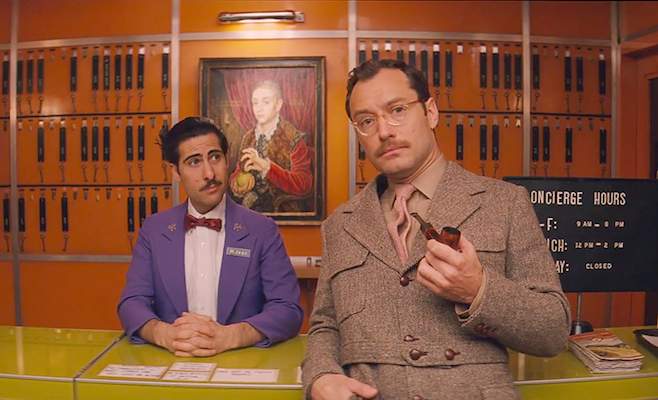The Grand Budapest Hotel
Eloquent, offbeat and charming, The Grand Budapest Hotel is Anderson's most accomplished film to date.
Overview
If movies were an assessable component in the American SATs, one might easily expect to find a question like: Ralph Fiennes is to comedy as Tyler Perry is to...?
(a) Costumes
(b) Makeup
(c) Playing multiple characters
(d) Films accessible to white people.
After all, this was the chap with the burned face from The English Patient, the Voldemort with the no face from Harry Potter and the Naziest bloody Nazi in Schindler's List. Excluding, for argument's sake, that 'incident on the plane', to think upon Fiennes was to consider class, panache and gravitas. Certainly, the next Bill Murray he was not. There's no doubt Fiennes is now experiencing something of a cinematic resurgence, particularly given his run as the newly minted 'M' in the Bond franchise, yet few could ever have expected that this Lazarus-esque revival would've seen him not just turn his mind to comedy but excel in it.
Yes, that was a long-winded prelude to reviewing Wes Anderson's The Grand Budapest Hotel, but in this — now his eighth feature film — it's the first time the director has centred everything on just one character, and, thankfully, his leading man delivers something extraordinary.
Fiennes is, quite simply, perfect. Playing the inimitable Monsieur Gustave H (the eponymous hotel's storied concierge), he's every bit the quirky protagonist an Anderson film requires but brings to the role an added layer of, well, Fiennes. Monsieur Gustave is, as one of the film's narrators observes, a man of a forgotten age. He's the manifestation of the Grand Budapest itself: elegant, refined, admired yet on the cusp of being left behind in a world scrambling over itself to modernise just as soon as anybody can arrange it.
Filmed in three separate aspect ratios to reflect the three distinct decades in which this story takes place, The Grand Budapest Hotel is, typically, steeped in playful innocence yet forever flirting with a darkness just beneath the surface. It's been a growing trend for Anderson, whose last film, Moonrise Kingdom, was a decidedly black comedy grounded in his otherwise traditional quirkiness. Grand Budapest takes it even further: fingers are severed, cats are lobbed out of windows and prison guards are dispatched with bloody abandon. That all such moments elicit more laughter than horror is a testament to Anderson's unique style and direction.
Naturally, The Grand Budapest Hotel is also brimming with cameos from Anderson faithfuls and newcomers alike. Murray, Wilson, Swinton, Schwartzman, Norton, Goldblum, Dafoe and Brody all have their go again, whilst Saoirse Ronan, Harvey Keitel and Jude Law gain entry into the team. There is a caper-based plot focused upon the contested inheritance of a priceless painting, but The Grand Budapest Hotel begins and ends as a character study, and it's in that study that the unbridled joy of watching this film is to be found.





